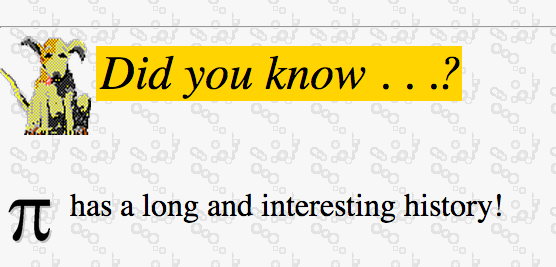The History of the History of Pi
Unless you’ve been hiding under a rock, you know that today is pi day, as in March 14 (3.14).
What you might not know is that the history of pi has a UALR connection, at least as far as the internet is concerned.

Today, if you were to look up the “history of pi” on Google, one of the top search results takes you here, to a page created in what could be considered the infancy of the internet.
Dr. Laura Smoller, professor of history here at UALR, created that page along with several other math-related ones more than a decade ago at the request of then-Chancellor Dr. Charles Hathaway, whose doctoral degree just happens to be in physics.
Hathaway, as Smoller recalled, wanted the UALR website to feature a series of pages explaining the history of mathematics. He tapped Smoller to craft the online lessons, which would be created in conjunction with what was then the Donaghey College of Information Science and Systems Engineering.
As Hathaway envisioned it, the pages would help the high school students of Arkansas learn a little more about the higher levels of math that they would be taking once they entered college. This way, Smoller said, a “student in a school where trig wasn’t offered could be up to speed.”
Smoller discovered that she would be creating the pages at the University Assembly when Hathaway announced it to the entire faculty.
“I just hear him say out of the blue, ‘And I’m going to ask Dr. Laura Smoller to help build these sites,'” Smoller laughed. “That was the first I learned of it.”
Smoller was given a few months to work on the project. It was fun, the Harvard graduate said, because she got to delve into one of her specialties, the history of science.
She also used a focus group of high school students, trading pizza for feedback on the sites.
Her work won her a prize for teaching with technology.
Nowadays, Smoller sees the pages an archived snapshot of a long-ago project.
But the internet hasn’t forgotten about the history of pi.
Smoller, who doesn’t maintain the site anymore, said she’s thought about pulling the pi site and others, but then someone always reaches out to her, whether it be a high school math teacher who said her students found it useful or pi fanatics who want to share even more 3.14 trivia.
Smoller still receives emails about the page, including one from her old next door neighbor growing up who came across the site while helping his daughter with a school project.